Shared Playbook

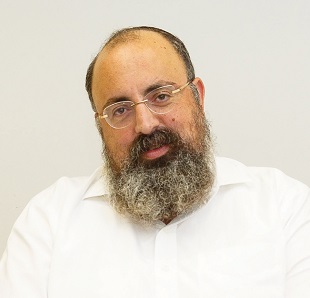
Ukraine war opens new front in Lubavitcher library battle
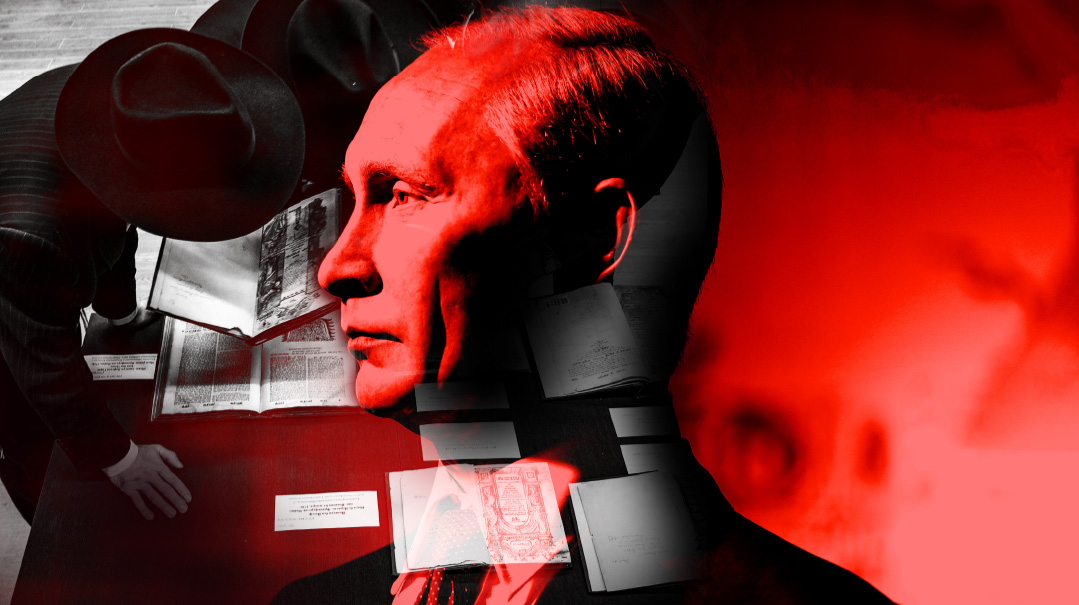
When the US government announced last month that it would hunt down and seize Russian assets in an effort to sanction Russia for invading Ukraine, no one was happier than the Chabad chassidus, because that’s what Chabad has been trying to do for years.
For over three decades, Chabad has been locked in a faceoff with the Russian government over possession of a massive and priceless seforim collection that had been the private possession of the Chabad rebbes before the two world wars, while Moscow declares that the collection of thousands of rare published volumes and manuscripts, currently held in Russia’s national Lenin Library, is part of Russia’s cultural heritage. Lubavitcher activists, under instruction of the Lubavitcher Rebbe zy”a, want to see the collection reunited with the world-famous Chabad archive maintained at the chassidus’s headquarters in Crown Heights.
For years, the US had opposed Chabad’s efforts to seize Russian assets as a bargaining chip in that quest, but now America is going after the very same funds.
The legal saga began in 2004, when Chabad-Lubavitch filed a lawsuit in US federal court to demand that Russia return the texts. Putin’s government vigorously contested the case, arguing that a US court had no jurisdiction over a foreign nation. The dispute lingered for five years, when US District Judge Royce Lamberth issued a final ruling holding the Russians in contempt of court and awarded Chabad $50,000 a day for every day that Russia did not return the books. By now, that comes to over $165 million.
Subsequent court orders have authorized Chabad to claim certain Russian assets in the amount of the fine, but claiming those assets requires finding them first. That’s because so much of Russian wealth is tied up in private companies.
But now, in the wake of the Russian invasion of Ukraine and the shift in international diplomacy toward the Russian regime, Chabad is changing its tactics and looking toward Russian assets around the world.
Chabad’s leaders in the US, guided by international lawyers, are looking into targets such as real-estate, churches, and Jewish treasures stolen by the Nazis and then nationalized by the Red Army as it overran eastern Germany at the end of war. President Putin himself has asserted ownership of Russian cultural treasures abroad — in Europe and even in Jerusalem — including the Russian Compound, the Russian Orthodox Cathedral, the Alexander Courtyard, and other assets that Putin cajoled or bullied previous Israeli prime ministers into ceding to Russia.
“We’re under orders to follow every available legal avenue to make it clear to the Russian government that we won’t let them rest until they return the stolen books, which belong to the Chabad chassidus,” Rabbi Shlomo Cunin, head Chabad shaliach in California and an original taskforce member appointed by the Rebbe over 30 years ago to recover the collection, told Mishpacha. “For the Russians, this isn’t about money. Our new strategy is to target assets with important cultural and sentimental associations for Russia. What this means is that we’ll hunt down Russian cultural treasures beyond Russia’s borders until the Russians understand that they have to return the books to the Agudas Chassidei Chabad library in New York.”
In Israel, attorneys Avi Blum (a Mishpacha contributor) and Uri Kedar, an expert in international law, are leading Chabad’s effort to track down and confiscate Russian assets in Europe and the Middle East. The Russian government has already hired legal counsel to defend its assets, meaning that Chabad’s first objective has been achieved: bringing the subject back to the agenda in Russia, even in the midst of the war.
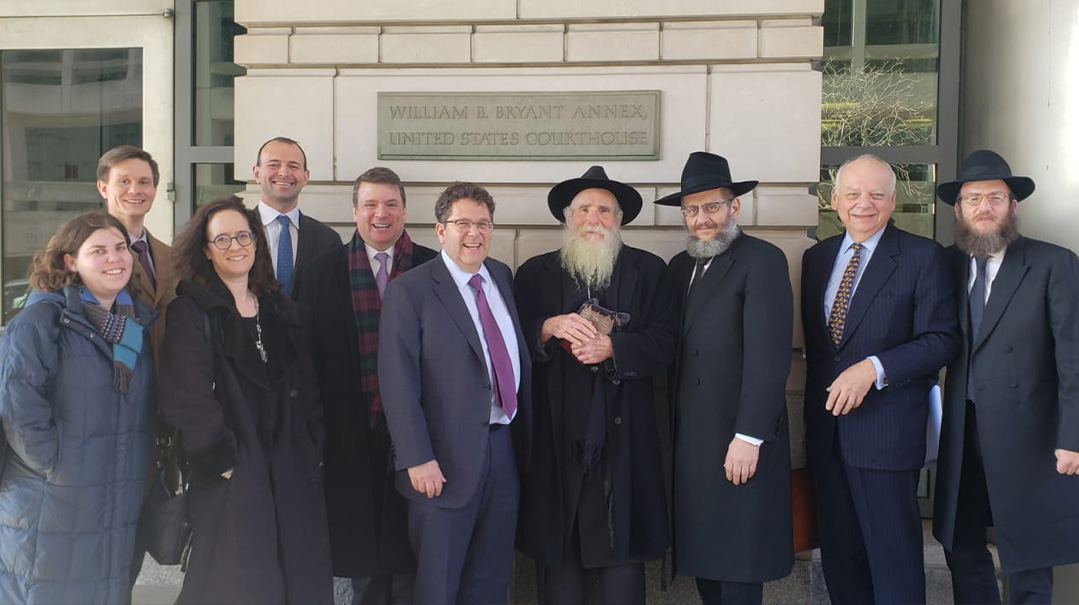
Chabad askanim celebrate with Judge Lamberth after last year’s ruling authorizing Chabad to claim certain Russian assets equivalent to the accrued $165 million fine
Gone Forever?
Rabbi Shalom Ber Levine, who was another member of the taskforce to retrieve the Schneerson library and spent over a year in Moscow in that effort, is in charge of the library of Agudas Chassidei Chabad of the Chabad world headquarters in the Crown Heights section of Brooklyn. The library, which boasts over a million titles, original manuscripts, and historical objects from the chassidus’s great leaders over the centuries, is considered to be one of the most important Jewish libraries in the world. The Rebbe himself was known as a bibliophile, aware of every important sefer in the library.
“The wider public knew the Lubavitcher Rebbe as a great Jewish leader, but not everyone is aware of his passion for book-collecting. It goes all the way back to his ancestor, the Baal HaTanya, founder of Chabad chassidus, who amassed a huge collection of rare books and manuscripts,” says Rabbi Levine. The rebbes who came after him followed in the tradition.
Many of the thousands of books in the disputed Schneerson Collection held in the Lenin Library are of great general historical value, such as Sh’eilos V’Teshuvos L’Rabeinu Asher published in Venice in 1533, or the Baal Shem Tov’s personal siddur, written by his brother-in-law Rabbi Gershon of Kitov and featuring hand-written requests by his talmidim to mention them during his davening.
The story of the library’s exile began toward the end of World War I, when the German military approached the Russian town of Lubavitch. The Rebbe, Rav Sholom Dovber (known as the Rashab), along with his son Rav Yosef Yitzchak (known as the Rayatz), were forced to flee Lubavitch and settled in the town of Rostov.
The Rebbe Rashab had great anxiety over what would become of his approximately 12,000 seforim. Ultimately, one of his chassidim offered to transport the collection to Moscow for temporary safekeeping, and indeed, the books were transferred to a storehouse where they would be safe from water damage, cold, and looting for the remainder of the war. The Rashab, who died in Rostov in 1920, would never see his books again.
As the Russian Empire collapsed and the Bolsheviks seized power, one of their first measures was widespread confiscation of private property — and they soon stumbled upon the Rashab’s library.
One officer, a Jew who read Hebrew, came across the massive collection, realized its value, and ordered it to be sent to the national Lenin Library. Under the new law of the land, every library with over 1,500 titles was nationalized.
After the end of World War II, the Rebbe Rayatz, then living in New York where he had fled during the Holocaust, began making inquiries about the books and how they might be retrieved. But according to the Soviet government, they were a precious national treasure and could not be removed from the Russian people. For years the effort to reclaim the books languished. But the Rebbe Menachem Mendel Schneerson, the Rayatz’s son-in-law, continued the struggle.
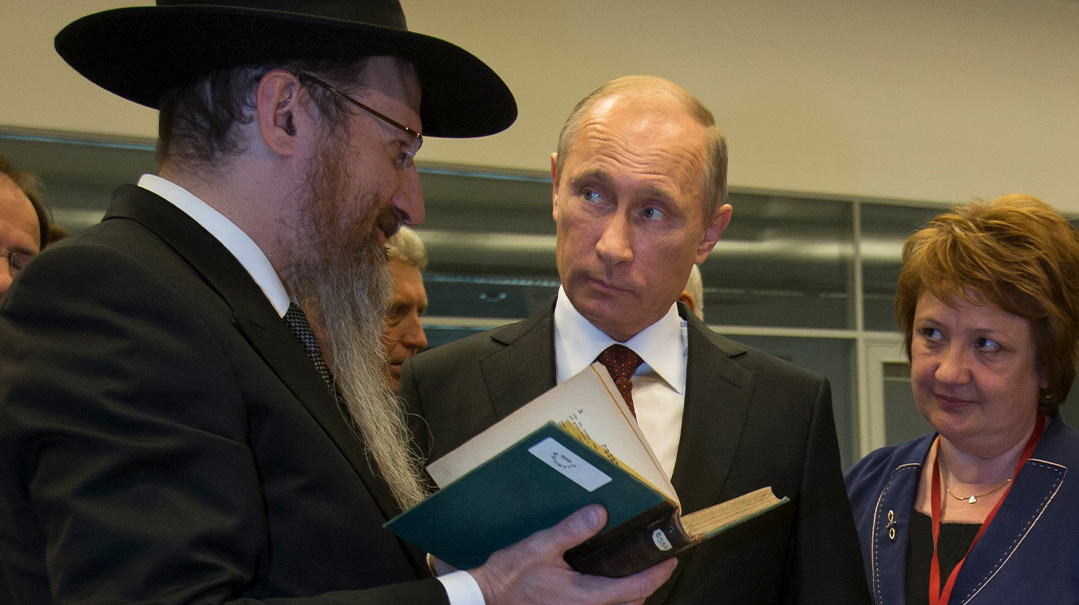
Rabbi Berel Lazar and President Putin at the ceremony transferring part of the collection to a government facility attached to the Jewish center. “Putin believes that they are part of the Russian heritage and won’t send them abroad”
In 1991, the Rebbe sent a delegation to Moscow to try and make headway with the library that included Rabbi Levine, Rabbi Cunin, Rabbi Yitzchak Kogan of Moscow, and Rabbi Yosef Yitzchak Aharonov, director of the Tzeirei Chabad in Israel.
The delegation was able to arrange meetings with leading government officials, from Premier Mikhail Gorbachev to President Boris Yeltsin. But those meetings proved to be just another Russian tactic to shatter the delegation’s morale — they raised their hopes, but then pulled back, without any real intention of meeting their request. (They didn’t get the library, but they did lay the groundwork for Chabad’s ongoing activities on Russian soil as Communist Soviet Union was about to collapse.)
But the seforim remained where they were. Even after all 100 US senators signed a letter backing Chabad’s request for the return of the collection, the Russian government had hardened its heart, and Putin — who took over as president in 2000 and had a good relationship with the shluchim and the growing Jewish kehillos — maintained the stubborn refusal to hand over the books.
Along the way, a variety of creative solutions were proposed. At one point the Russians suggested sending the books to America as an exhibit, where they could be hosted at the Lubavitch library.
“And when then-President Bill Clinton’s vice president Al Gore flew to Russia and visited the Lenin Library,” says Rabbi Aharonov, “he was given the Sefer HaTanya from the collection that belonged to the Rebbe Rayatz. That was supposed to be a kind of reconciliation.” But the Rebbe, who was niftar in 1994, made it clear at the time that anything less than full possession should be rejected out of hand.
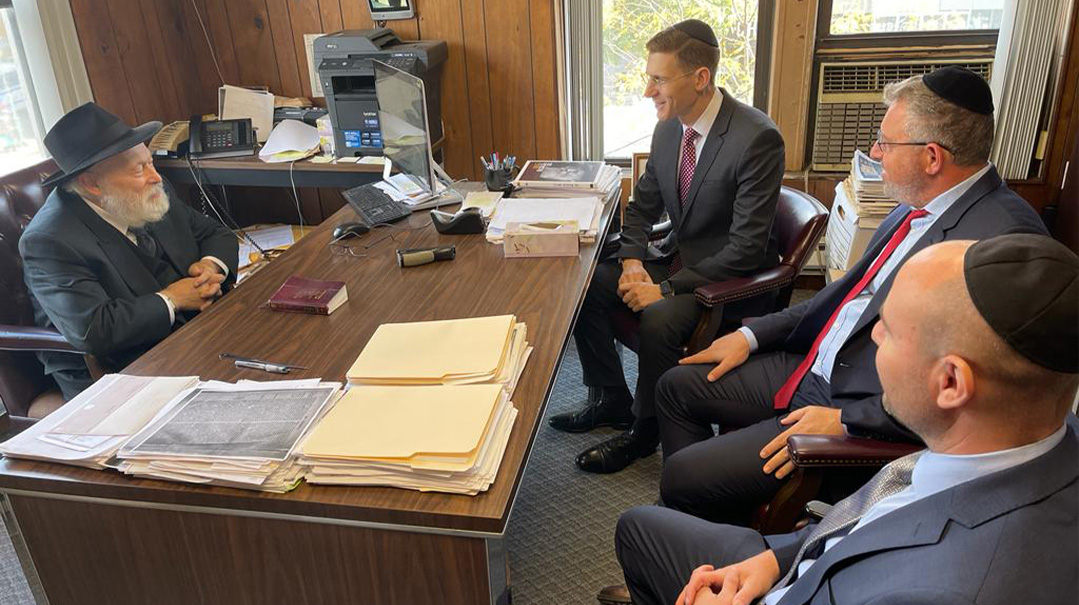
Chabad administrator Rabbi Yehuda Krinsky, secretary of the Rebbe, in conference with attorneys Avi Blum and Uri Kedar about the possibility of seizing Russian assets in the Middle East, particularly in Jerusalem
Hidden Assets
Left with no choice, Chabad filed the lawsuit in 2004. Years later, after the district court judge awarded Chabad $50,000 a day for every day that Russia did not return the books, another case was being decided in Moscow, going back to 1992, when the Russian government sent a series of cultural objects, including seven books from the Schneerson Collection, to an exhibit at the National Library of Congress, which the Americans pledged to return after the exhibition.
When the books arrived in the US, Chabad turned to Congress to request that they be returned to the Chabad library rather than to the Russians. A Washington court approved the request, and the loaned books were given to Chabad. The fuming Russians brought a case to a Moscow court, which ruled that the Congress must return the books to the Lenin Library. For every day the books remained in America, the country would be fined $50,000.
After the judge’s ruling, Russia realized that American pressure was serious, and opened secret talks with Chabad in a little-known conference in Helsinki, Finland. Because of the secrecy, all the participants flew in on private jets, including Rabbis Levine, Aharonov and Cunin, plus Jewish billionaire Ron Lauder, who flew with the Lubavitcher’s Rebbe’s personal secretary and chairman of the Merkos L’Inyonei Chinuch, Rabbi Yehuda Krinsky. From Moscow came the private plane of oligarch Mikhail Fridman, a confidant of Russian president Vladimir Putin. The purpose of the meeting was clear: Russia intended to return the books to the Chabad library in America and bring the saga to an end.
“At the end of the secret conference it was decided that a ceremony would be held at the Kremlin to return the books with the attendance of President Putin,” Rabbi Levine reveals.
But that never happened. In the end, as an interim solution to dial down tensions, President Putin decided in 2013 to transfer the books to the Jewish Museum and Tolerance Center in Moscow, which is attached to the shul and community center headed by Russian Chief Rabbi Berel Lazar – making the area where the books would be kept as a part of the state library.
“He didn’t give them over, and he didn’t ask us. He just transferred the location of the books from the state library to our museum,” Rabbi Lazar told Mishpacha last year, when Chabad first began looking into Russia’s US-based assets. The Russians did sweeten the pie, though. They never returned the books, but they did scan more than 4,500 books in the Schneerson Collection, making them accessible to everyone with the click of a mouse. However, none of the tens of thousands of manuscripts, letters, documents and photographs were handed over to the museum. The Rebbe Rayatz left these documents behind in Poland when he fled to America during World War II, and they ended up first in the hands of the Nazis, and then were taken by the Red Army to Moscow, where they are still being kept in the Russian State Military Historical Archive.
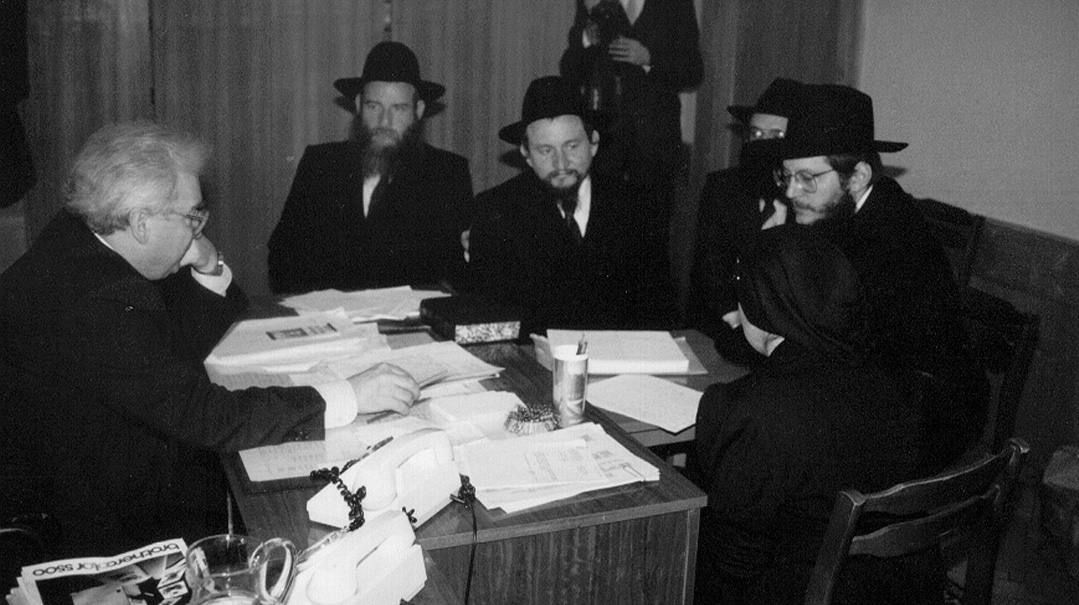
In the early 1990s, the original delegation in a meeting with Russia’s foreign minister built up hopes that came crashing down. (From left) Rabbis Shlomo Cunin, Shalom Ber Levine, and Yosef Yitzchak Aharonov
“Putin believes that they are part of the Russian heritage and will not send them abroad,” Rabbi Lazar explained. “The Russians are afraid that if they send these books abroad, then there will be other countries that will also claim that the Russians stole their property as war booty.”
Last year, Federal judge Royce Lambert, who hit the Russians with a $50,000-per-day fine a few years back, ordered that the building of Tenex, a subsidiary of a Russian state-run company that sells uranium to nuclear power plants in the US, be turned over to Chabad in consideration for the debt.
By late 2021, two entities had emerged as Chabad’s primary targets: Russia’s main development bank, VEB, and Tenex. The US announced sanctions on VEB on February 22 in the lead-up to Russia’s invasion of Ukraine, freezing the bank’s US assets. Chabad is now seeking a court order that would force financial institutions in the US to provide full disclosure of all Russian assets in their charge, as a step toward seizure of Russian government property to cover its mounting debt to Chabad.
Initially, the US State Department cautioned Chabad against following through with these proceedings, which could provoke a serious international incident. They recommended more diplomatic solutions, but Judge Lambert cynically rebuffed them, saying, “I think you’ve proven that your diplomacy over the past 30 years has helped about as much as my ruling.” The judge is expected to provide a court order in the coming month that will finally allow Chabad to go forward with its plan.
The war in Ukraine may have shut the door on diplomacy, but it has opened new opportunities for Chabad. Unlike in the past, the US and even Europe might now be happy to stand by Chabad in its fight to recover the Jewish cultural treasures. While the final word in this battle of the minds has yet to be said, the first word — that of the Lubavitcher Rebbe who set the goal — is ever before his chassidim, who refuse to back down.
(Originally featured in Mishpacha, Issue 919)
Oops! We could not locate your form.







